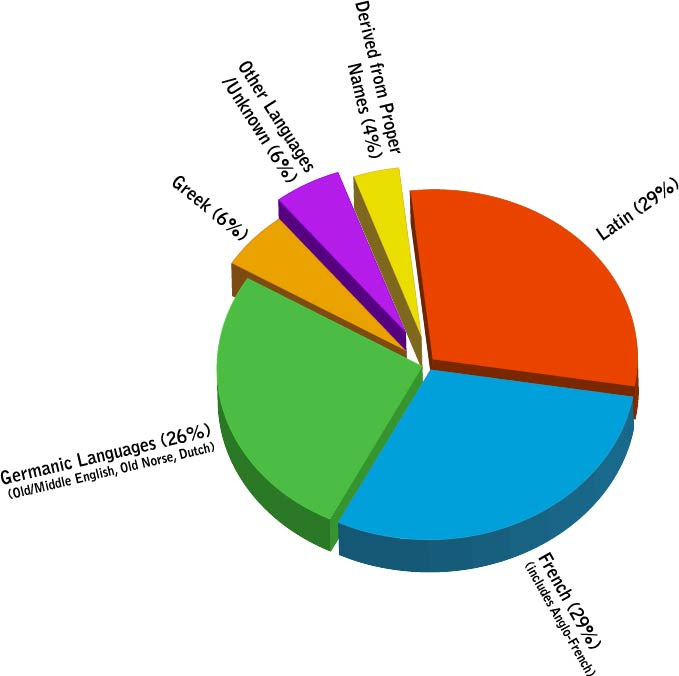Winning English - Mastering Idioms, Slang, and Cultural References
Influence of Greek and Latin on English • Telephone/Television • Democracy • Economics • Agenda • Lunar/Solar • The metric system • Herculean • Christ • E pluribus unum
In my last post, I discussed how French has had a big impact on the English language. This time I’ll finish my short series on influences on the English language by talking about Greek and Latin.
Interested in a podcast version of Winning English? Check out my site on Podbean or find it in your favorite listening app.
Would you like a piece of pie?
To start off, let me return to the information in a pie chart from Wikipedia that I featured in the last post:

According to these estimates, almost a third of English is actually composed of words that come from Greek and Latin. (Just to clarify, Latin was the language of the Roman Empire in what today is the country of Italy, while Greek comes from the area now known as the country of Greece.)
The impact on vocabulary
So many English words are influenced by these two languages that it’s hard to pick out just a few examples. Over time, you’ll likely get better at spotting them yourself because these words have shorter word parts that we can identify. If the word parts are at the beginning, they are called prefixes. If they are at the end, they are called suffixes.
Greek
First, let’s cover Greek.

Do you own a telephone? How about a television? The prefix “tele” comes from Greek, and it means “far away”. “Phone” means “voice” in Greek. “Vision” means sight, but it actually comes from Latin. So, put all of these together, and telephone means “far away voice”, and television means “far away sight”. That makes sense, right?
Do you live in a democracy? Have you studied economics? These words are derived from Greek, as well. “Demos” means “the common people”. The suffix “-cracy” means “government”. So, democracy is “government by the common people”. “Eco” comes from the Greek word for “home” or “family unit”, and the second half “-nomics” has come to mean a field of study. So, put together, “economics” means something like “study of how to care for, or supply, the home”, which again, makes sense I think.
Latin
Let’s look at some examples from Latin now.

Perhaps you’ve attended a meeting or two in your career. It’s likely that you’ve had an agenda for that meeting. An “agenda” is a list of what is to be discussed at that meeting. Agenda comes from Latin, in which it means “things to be done”.
Next, let’s turn to the skies. You know about the moon and sun, of course. But the adjectives for these words are lunar and solar. For example, a lunar lander is a machine that lands on the moon. A solar eclipse is when the sun is blocked by the moon. Both lunar and solar are derived from the Latin words for moon and sun.
Scientific language
Beyond these everyday words, both Greek and Latin have had an enormous impact on scientific and medical language. Scientists decided long ago to use words derived from these languages, rather than other languages. Here are two examples:
Hydro- is a word part that means “water” in Greek. So, anytime you see it, you know the word has to do with water or liquids. For example, dehydration. If you suffer from dehydration, you need water.
Also, the metric system is based on sticking together Latin and Greek roots. Centi- is Latin for one hundredth of something, while deci- is Latin for one tenth. Meter comes from the Greek word “metron”, which meant “measure”. So, putting these together, a centimeter, for example, is one hundredth of a meter.
The cultural impact of Greek and Latin
But the impact of Greek and Latin is beyond just everyday and scientific words. There have been cultural influences, as well.
Ancient Greek culture is a source for many western myths. Myths are stories about the past that often involve gods, heroes, monsters, and adventures. These stories sometimes lead to common words. For example, Hercules was a hero that overcame difficult, dangerous tasks, usually using his immense strength. So, nowadays, if someone does that, we can say he or she put in a Herculean effort. That is, the person worked very hard and used all of his or her strength to accomplish the goal.

Also, Greek was one of the original languages of the Bible, which - as I explained in a previous post - had an enormous impact on English sayings and idioms. It also brought new words into the language. For example, Christ, as in Jesus Christ, the central religious figure in Christianity. Jesus was called the “Anointed One”, which meant specially chosen by God. The Greek word for anointed was “khristos”, which eventually became “Christ”.
And finally, it’s very common for groups to create mottos using Latin. Mottos are short phrases that try to capture the purpose or some important characteristic of a group. One example is “E Pluribus Unum”, which is the motto of the United States. It means “out of many, one”. In other words, the US is one country, made out of many, diverse people. Most universities also have Latin mottos.
Want more on Greek and Latin?
I hope you’ve enjoyed this exploration. Do you want more on the impact of Greek and Latin on English? For Greek, check out these two excellent sources. For Latin, these two Wikipedia entries would be helpful.
Even more on the origins of English
I also hope you’ve enjoyed this short series on some of the main influences on the English language. If you’re interested in exploring the origins of English a bit more - with plenty of pictures and maps - click through to this excellent article from Vox. Enjoy!
Please help support Winning English
Thanks for being part of Winning English! If you like this service, please subscribe to this newsletter, subscribe to my YouTube channel, and as always, please tell a friend about it. I’m really looking to grow this project, and I need your help. Also, please consider supporting it via Patreon. Your social and financial support would really inspire me to keep this going. Talk soon! 😄
Bill


